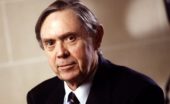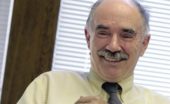Re Ian Bremmer 'Could third-party candidates upend the 2024 US election?' 3 April The current political movement in the USA…
Christopher Hitchens: 1949-2011
Written by Diana Thebaud Nicholson // December 16, 2011 // Media // Comments Off on Christopher Hitchens: 1949-2011
In Memoriam: Christopher Hitchens, 1949–2011
(Vanity Fair) Christopher Hitchens—the incomparable critic, masterful rhetorician, fiery wit, and fearless bon vivant—died today at the age of 62. Hitchens was diagnosed with esophageal cancer in the spring of 2010, just after the publication of his memoir, Hitch-22, and began chemotherapy soon after. His matchless prose has appeared in Vanity Fair since 1992, when he was named contributing editor.
“Cancer victimhood contains a permanent temptation to be self-centered and even solipsistic,” Hitchens wrote nearly a year ago in Vanity Fair, but his own final labors were anything but: in the last 12 months, he produced for this magazine a piece on U.S.-Pakistani relations in the wake of Osama bin Laden’s death, a portrait of Joan Didion, an essay on the Private Eye retrospective at the Victoria and Albert Museum, a prediction about the future of democracy in Egypt, a meditation on the legacy of progressivism in Wisconsin, and a series of frank, graceful, and exquisitely written essays in which he chronicled the physical and spiritual effects of his disease. At the end, Hitchens was more engaged, relentless, hilarious, observant, and intelligent than just about everyone else—just as he had been for the last four decades.
“My chief consolation in this year of living dyingly has been the presence of friends,” he wrote in the June 2011 issue. He died in their presence, too, at the MD Anderson Cancer Center in Houston, Texas. May his 62 years of living, well, so livingly console the many of us who will miss him dearly.
Graydon Carter Remembers Christopher Hitchens
Peter Hitchens: In Memoriam, my courageous brother Christopher, 1949-2011
(Daily Mail, UK) How odd it is to hear of your own brother’s death on an early morning radio bulletin. How odd it is for a private loss to be a public event.
I wouldn’t normally dream of writing about such a thing here, and I doubt if many people would expect me to. It is made even odder by the fact that I am a minor celebrity myself. And that the, ah, complex relationship between me and my brother has been public property.
I have this morning turned down three invitations to talk on the radio about my brother. I had a powerful feeling that it would be wrong to do so, not immediately explicable but strong enough to persuade me to say a polite ‘no thank you’.
Christopher Buckley’s Postscript: Christopher Hitchens, 1949-2011 is a beautiful and touching piece of writing, erudite and filled with humour. Of all of the tributes, certainly one of – if not the – best.
The LA Times has published a number of excerpts of tributes, with links to the full articles
Christopher Hitchens has died: Fighter, doubter, provocateur
Elaine Woo: Christopher Hitchens dies at 62; engaging, enraging author and essayist
The British-American’s polemical writings on religion, politics, war and other hot-button topics established him as a leading public intellectual.
(LATimes Obituary) A swashbuckling opinionator, he loved few things better than a good argument — and he knew how to pick one. Once described by the New Yorker as “looking like someone who, with as much dignity as possible, has smoothed his hair and straightened his collar after knocking the helmet off a policeman,” he tarred Bill Clinton as a rapist, Mother Teresa as a fraud and Henry Kissinger as a war criminal. He argued in Vanity Fair that women were less funny than men, which stoked the wrath of female comics. “I am programmed by the practice of a lifetime to take,” he wrote, “a contrary position.”
David Corn: Hitchens and I Shared an Office
(Slate via Mother Jones) A very small, windowless office. Here’s what I learned about him.
Jonathan Kay on Christopher Hitchens:
Remembering the greatest columnist and essayist in the English-speaking world
(National Post) As the greatest columnist and essayist in the English-speaking world, Christopher Hitchens (1949-2011) was read and admired by millions of readers — including National Post readers. But he was even more admired by fellow journalists: Hitchens did things the rest of us are scared to do, like subject himself to waterboarding so he could decide whether it’s truly torture (it is), or travel to Iraq at the height of the war. Hitchens also had the editorial courage to express what was in his brain, without first pushing his words through the “who will this piss off?” filter that just about every other columnist on earth uses to avoid alienating his “base.”
Atheist intellectual Christopher Hitchens dead at 62
(Reuters) – British-born journalist and atheist intellectual Christopher Hitchens, who made the United States his home and backed the 2003 U.S. invasion of Iraq, died on Thursday at the age of 62.
Hitchens died in Houston of pneumonia, a complication of cancer of the esophagus, Vanity Fair magazine said.
(Foreign Policy) We were saddened here to learn today that the pugnacious columnist and literary icon Christopher Hitchens has passed away. For the rememberances of the colleagues who knew him best, head over to our sister site Slate where Hitchens wrote the weekly “Fighting Words” column until just a few weeks ago, despite his ongoing fight with cancer.
Not surprisingly, given his wide-ranging interests in international affairs, Hitchens was a periodic contributor to Foreign Policy.
Polemicist Who Slashed All, Freely, With Wit
(NYT) Christopher Hitchens, a slashing polemicist in the tradition of Thomas Paine and George Orwell who trained his sights on targets as various as Henry Kissinger, the British monarchy and Mother Teresa, wrote a best-seller attacking religious belief, and dismayed his former comrades on the left by enthusiastically supporting the American-led war in Iraq, died on Thursday in Houston. He was 62.
He took pains to emphasize that he had not revised his position on atheism, articulated in his best-selling 2007 book, “God Is Not Great: How Religion Poisons Everything,” although he did express amused appreciation at the hope, among some concerned Christians, that he might undergo a late-life conversion.
He also professed to have no regrets for a lifetime of heavy smoking and drinking. “Writing is what’s important to me, and anything that helps me do that — or enhances and prolongs and deepens and sometimes intensifies argument and conversation — is worth it to me,” he told Charlie Rose in a television interview in 2010, adding that it was “impossible for me to imagine having my life without going to those parties, without having those late nights, without that second bottle.”

